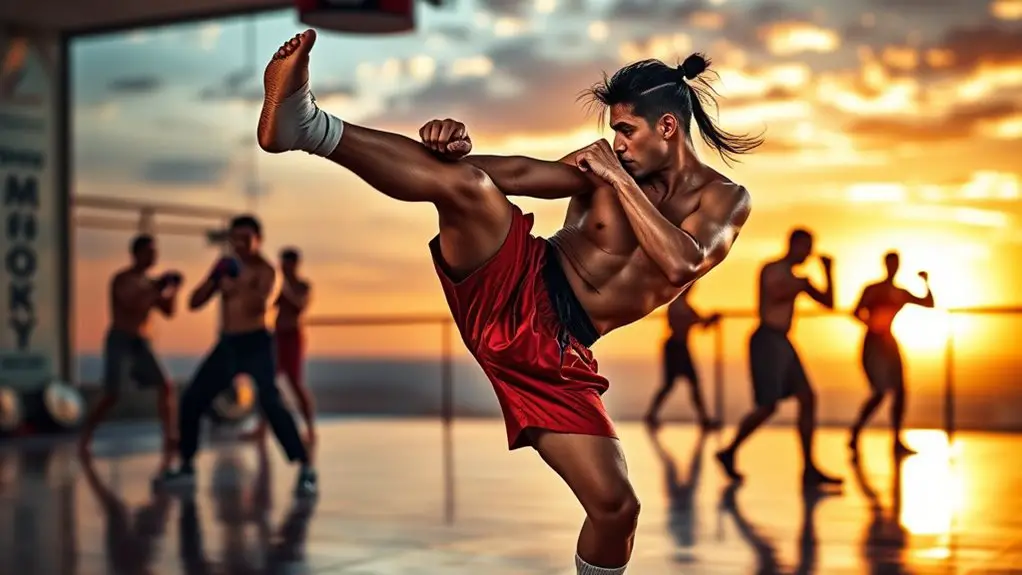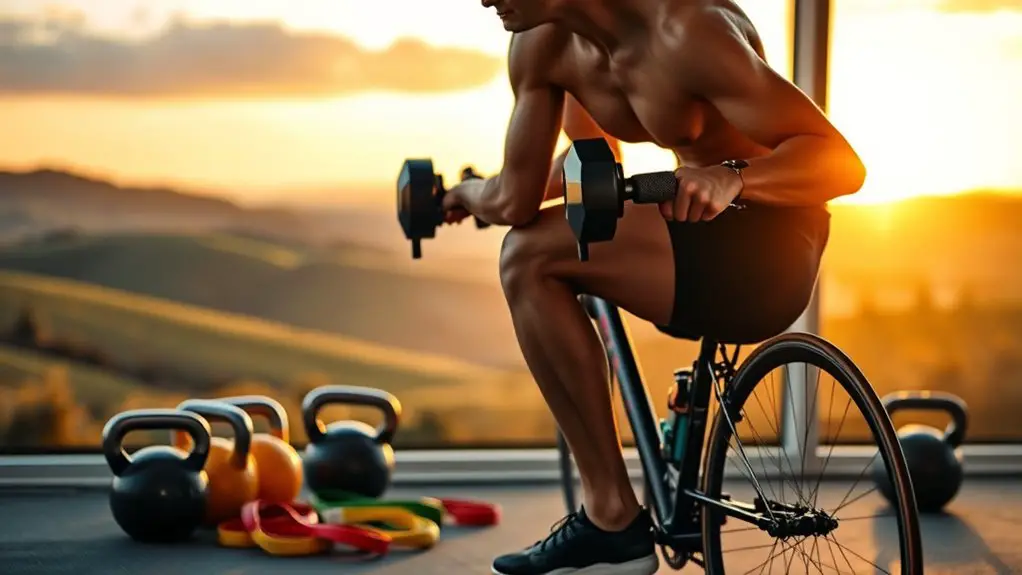Core strength plays an essential role in improving your rowing efficiency. It stabilizes your body, enhances balance, and guarantees effective energy transfer from your legs to the oars. A strong core also helps maintain proper posture, reducing the risk of injury during strokes. Engaging in core training not only builds strength but also boosts your endurance and overall performance. Want to discover more about how to enhance your rowing through targeted core workouts?
Understanding Core Strength in Rowing
When you think about rowing, it might be easy to overlook the importance of core strength, but it's essential for your performance. Your core not only stabilizes your body but also enhances your ability to maintain balance while you're gliding through the water. By focusing on core engagement, you'll find that each stroke becomes more powerful and controlled, leading to a smoother ride.
As you row, a strong core helps you transfer energy effectively, allowing you to harness the freedom of movement without wasting effort. Balance improvement comes naturally when your core is engaged, as it allows you to adjust your body position seamlessly. This stability lets you connect with the rhythm of the water, making every row feel more exhilarating. A well-conditioned core supports your spine during exertion, ultimately enhancing your overall performance. So, take time to strengthen your core; it's not just about power but about releasing the freedom to row with confidence and grace.
Physiological Benefits of a Strong Core
A strong core offers numerous physiological benefits that can greatly enhance your rowing performance. With proper core engagement, you'll find yourself more stable and balanced in the boat. This stability translates into better power transfer from your legs through to your arms, making each stroke more efficient. Additionally, a strong core is key for injury prevention. By supporting your spine and pelvis, it helps you maintain proper posture, reducing strain on your back and other vulnerable areas during intense rowing sessions. You'll also notice improved endurance, as a solid core allows you to sustain effort over longer distances without fatigue. Plus, a strong core fosters better breathing mechanics, which can boost your overall stamina. Embracing the benefits of core strength not only enhances your performance on the water but also brings a sense of freedom and confidence in your rowing journey. Moreover, incorporating mobility training can further enhance your core stability and overall movement efficiency.
Techniques for Strengthening Your Core
Strengthening your core doesn't have to be complicated; there are several effective techniques you can easily incorporate into your routine. Start with plank variations—these are fantastic for building overall stability. Try the side plank for added oblique engagement or the forearm plank for a solid foundational hold.
Next, stability exercises are key. Incorporate movements like bird-dogs or dead bugs, which challenge your core while promoting coordination. You can even use a stability ball for added fun and effectiveness.
Don't forget about incorporating dynamic movements, like Russian twists or mountain climbers, to keep your workouts engaging and functional. Additionally, focusing on core stability and strength is crucial for enhancing your performance in various athletic activities.
Core Strength and Stability During Rowing
While rowing may seem like a straightforward activity, having a strong and stable core is crucial for maintaining proper form and maximizing efficiency. When you're out on the water, your core stability plays an important role in how well you can transfer power from your legs through your body to the oars. If your core isn't engaged, you risk losing balance, which can disrupt your rowing mechanics and hinder your performance.
A stable core allows you to maintain a solid posture, enabling smooth and controlled movements during each stroke. You'll find that a strong core helps you stay centered in the boat, making it easier to navigate through choppy waters. Plus, it minimizes the risk of injury by providing support to your spine. So, as you row, remember that enhancing your core stability not only boosts your efficiency but also gives you the freedom to enjoy the rhythm of the water. Additionally, strengthening your core muscles can lead to better posture, which reduces strain on your body during rowing.
Enhancing Rowing Performance Through Core Training
Engaging in targeted core training can greatly enhance your rowing performance. By focusing on core conditioning, you'll build the strength and stability needed to maximize your power and efficiency on the water. A strong core acts as a foundation, allowing you to transfer energy effectively from your legs through your torso to the oars. This connection not only boosts your performance improvement but also reduces the risk of injury. Incorporating exercises like planks, Russian twists, and medicine ball throws into your routine will help develop the necessary core muscles. You don't have to spend hours in the gym; even short, focused sessions can yield significant results. Plus, a stronger core gives you the freedom to row longer and harder without fatigue. So, embrace core training as an essential part of your regimen, and experience the difference it makes in your rowing journey. Additionally, ensuring proper glute activation can further enhance your overall stability and power during rowing.
Frequently Asked Questions
Can Core Strength Prevent Injuries in Rowing Athletes?
Absolutely, core strength can play an essential role in injury prevention for rowing athletes. When you've got strong core stability, it helps maintain proper form and reduces strain on your back and joints. You'll find that a well-developed core allows for smoother, more controlled movements while rowing, minimizing the risk of overuse injuries. So, if you're looking for freedom in your performance, focusing on core strength is key to staying healthy and injury-free.
How Does Core Strength Influence Recovery Times After Rowing?
Core strength plays an essential role in your recovery after rowing. When you incorporate effective recovery techniques, like stretching and foam rolling, with strength training focused on your core, you'll find that your muscles recover faster. A strong core supports proper posture and reduces fatigue, allowing you to bounce back quicker and enjoy that sense of freedom on the water. So, prioritize core workouts to enhance your overall recovery experience.
Is Core Strength Equally Important for All Rowing Styles?
So, envision this: a sculler, balancing like a tightrope walker, while a sweep rower's trying to channel their inner octopus. Core strength's like that secret sauce, but it's not a one-size-fits-all. In sculling, you've gotta stabilize with finesse, while sweep rowing demands power and control. Both styles crave core strength, but the focus shifts. So, whether you're gliding solo or powering through with a crew, your core's gonna need some love—freedom depends on it!
What Are Common Misconceptions About Core Training for Rowing?
You might think core training is just about doing endless crunches, but that's one of the biggest core training myths. Many believe that a stronger core alone guarantees better rowing performance, which is another misconception. It's not just about strength; it's about stability, control, and integrating core work with your entire body's movement. Embracing a holistic approach will truly enhance your rowing, giving you the freedom to perform at your best on the water.
How Do Nutrition and Core Strength Relate to Rowing Performance?
Nutrition and core strength are like two sides of a coin; one can't thrive without the other. You've got to fuel your body with the right nutrients, paying attention to nutrition timing, to optimize performance. Meanwhile, core stability guarantees your movements are efficient and powerful. When you balance both, you're not just rowing; you're releasing your full potential on the water, feeling the freedom of every stroke. Get it right, and you'll soar.




